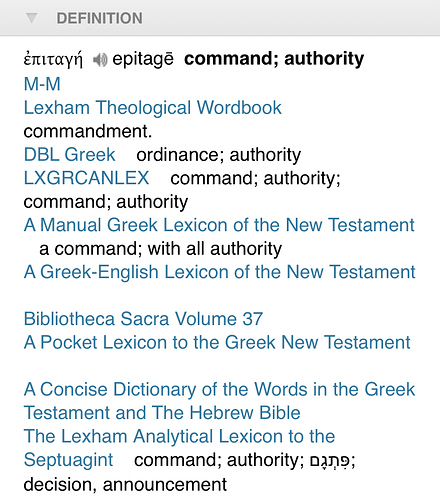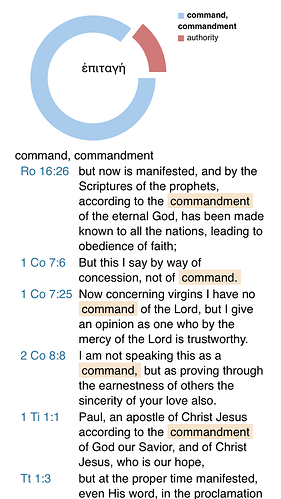Brothers, thank you all so very much. This dialogue we’re having is so helpful for my human-approval-seeking flesh. I’m grateful to God for how He’s sanctifying me through it. And I’m grateful for your loving endeavors to persuade me which, as I’ve suggested, is what elders particularly are to be engaged in.
So many things to respond to and I wouldn’t appreciate it if I asked something or proposed a challenge that was left ignored in a dialogue. It’s actually one of my pet peeves. So I’d like to try to love you as I love myself.
@danielmeyer, thank you for pointing me to 1 & 2 Timothy and Titus, brother. I will plan to go back and re-read them. But one of my challenges with those letters is that I don’t believe Timothy and Titus are pastors per se. Do they have a pastoral function? Without a doubt. But I think they are more apostolic delegates who serve a temporary apostolic function in the role Paul writes to them in, a role not dissimilar to the role Paul had as an apostle who planted, strengthened, corrected, etc several churches. I think the operative question is how much continuity is there/should there be between what such apostles do and what elders are to do? I think we typically understand that whatever apostles did, elders are to do. But I don’t think we should just assume that so I’m not convinced of it, though I’m open to being shown that we see such total continuity in the NT.
@Jesse, thank you for weighing in, brother. Of course elders are distinct in the responsibility God has laid on them to keep watch over souls. That’s actually the point I was making. Where we seem to disagree is in the nature of this distinction. I’m saying their distinction is in being the ones who do most of the teaching and who are the models for the rest of the saints in what it looks like to provide this watch care. I believe you (and others here) are saying the distinction is in a command-type of authority. It just seems to me that this command-type of authority is more inferred than explicitly demonstrated as attributed to elders anywhere in the NT. Here’s an interesting verse that ties in to the distinction I lean toward making between elders and apostles:
[15] For though you have countless guides in Christ, you do not have many fathers. For I became your father in Christ Jesus through the gospel. (1 Corinthians 4:15, ESV)
I mention it because it ties in with your analogy of you as a father commanding your children. I think Paul as an apostle had a unique authority that was different than elders. I would tend toward seeing elders as among the guides Paul speaks of. Which is why Paul can write to Corinth with a kind of command-authority, as he does Philippi and other churches. We know overseers are mentioned in Philippians (Philippians 1:1). Are they just not exercising authority properly in Philippi? If not, why wouldn’t Paul specifically rebuke them for that and call them to exercise it? Unless possibly they don’t carry the same kind of authority.
@ldweeks, thanks for the challenge. But, with all due respect, I don’t think your conclusion regarding the logical outcome of my position is fair, brother. I’m asking you guys to show me because when I read Calvin or whoever I can’t have a conversation with them the way I can with you. It’s more of a monologue to read those guys, which is why I’ve often had much writing in my book margins filled with exclamation points and question marks, which makes me want to at times pull my hair out because Calvin or whoever can’t help me with my questions/pushback. But, to come at it from another angle, the reason I’m telling you to show me in the NT is I hope the same reason you’ve trained your congregation to expect you to show you in the NT where you get your conclusions when you are trying to teach NT doctrine from the pulpit. Do you think they should embrace what you teach from the pulpit if you were to point them to Calvin or Bannerman or whoever as one who makes an irrefutable case for a doctrine? Would you tell your congregation from the pulpit that you can’t convince them but Calvin or Bannerman can? Brother, I really hope not. Because if so, with love, I wouldn’t encourage anyone to sit under that teaching. You first show them in the text so that it is undeniably clear and then point them elsewhere for further reading. But if you can’t make it clear, I doubt those guys will make it clearer but rather will multiply pages upon pages in muddying the waters.
@jtbayly, thank you for the challenge and for pointing me to Titus 2:15 in particular. This gets to what I was saying above regarding how much continuity there is between apostles and elders which I concede is something that isn’t clear to me. I do believe that apostles have a kind of command-authority. And Titus is such an apostolic representative, not a pastor per se (though he definitely did things that are pastoral in nature). He’s in Crete doing the kind of work that Paul did as a church planter. What I’m not convinced of is that all of the functions that apostles fulfilled are continuous to elders in that the latter fulfill all the same functions.
@John, thanks for the pointer to James 3:1. Good question, brother. I agree from this passage that teachers are held to a higher accountability. But, based on context, it seems to me that this is tied in with the responsibility that comes with speaking (the whole context of 3:1-12 pertains to what we do with our mouths), as Jesus taught that we will give an account for every careless word we speak (Matthew 12:36). Exegetically, I think this responsibility of teachers is tied to speaking. And this makes sense since, as I mentioned above, I think the greater authority that teachers have is that they are teaching the Word of God more than others in the community and thus they are speaking more than others! I don’t believe exegetically that this text bears out a command-type authority that is distinct from authority other saints have. Or do you see otherwise in the text?
@ascryans, thanks for another text, brother. I think the important question is who the “us” is in 15:28? I think 15:22 makes clear that the “us” includes the whole church, which corresponds with the authority that I see Jesus giving to the whole church as a corporate whole in Matthew 18.
I hope you don’t grow exasperated with me brothers. I really am not trying to be contentious and hope you sincerely believe me. I welcome continued dialogue but understand that 1) this might already feel like beating a dead horse and 2) you all have responsibilities that are a higher priority than this. So if the conversation ends here, I’m grateful for the time you all have taken to try to help me.
And if we do continue the discussion, may God help us keep at the forefront of such disagreements as we week to persuade others who we believe to be in error:
[24] And the Lord’s servant must not be quarrelsome but kind to everyone, able to teach, patiently enduring evil, [25] correcting his opponents with gentleness. God may perhaps grant them repentance leading to a knowledge of the truth, [26] and they may come to their senses and escape from the snare of the devil, after being captured by him to do his will. (2 Timothy 2:24–26, ESV)
I know I have to remind myself constantly.
Not that we are opponents in the fullest sense of the word or that anyone here is necessarily in the snare of the devil, though I suppose you might think I am, which wouldn’t be necessarily wrong for you to think.
But it seems the charge would apply all the more in that case! 
Grace be with you brothers.


 ) James said:
) James said: